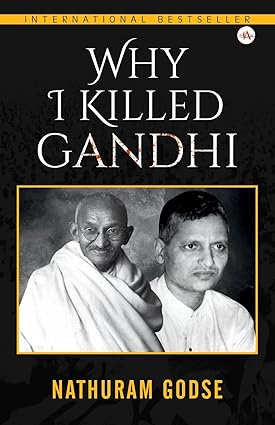Name of Reviewer - Nafisa Saify, Third Year B.A.B.Ed, Ashoka College of Education, Nashik. Although I personally don’t have much interest in politics, I was still drawn to the cover of this book. The title, Why I Killed Gandhi, intrigued me. I must admit,
Read More
Name of Reviewer – Nafisa Saify, Third Year B.A.B.Ed, Ashoka College of Education, Nashik.
Although I personally don’t have much interest in politics, I was still drawn to the cover of this book. The title, Why I Killed Gandhi, intrigued me. I must admit, my curiosity got the better of me. The quote, “Curiosity killed the cat,” holds a lot of weight in this context, as even though politics isn’t something I actively follow, I still found myself wondering why Mahatma Gandhi, one of the most influential figures in history, was murdered. This title immediately invited questions, and that curiosity led me to explore the book further.
The book is written from the perspective of Nathuram Godse, the man who assassinated Gandhi. It sheds light on his thoughts and justifications, which challenges many preconceived notions. As I went through the pages, I realized that Godse, in his own mind, was not a follower of Gandhi, as the world had always perceived him to be. In fact, he was constantly at odds with Gandhi’s ideologies. Godse’s main aim was to fight against what he saw as Gandhi’s excessive influence over the Indian masses and the political direction he was steering the country towards.
One of the striking aspects of this book is the way it paints Nathuram Godse as a man of strong beliefs, yet with a sense of rigidity that hindered his ability to compromise or see Gandhi’s vision. Godse’s views were largely shaped by his belief that India, after gaining independence, should be ruled by Hindus and that Gandhi’s policies were too lenient toward Muslims. According to Godse, Gandhi’s approach was weakening the nation’s integrity, and he saw the partition of India and the subsequent treatment of Muslims as the ultimate betrayal to Hinduism and the country’s sovereignty.
Godse’s arguments, although controversial, offer a unique and different perspective on the historical events that unfolded. He doesn’t shy away from criticizing Gandhi’s philosophy, nor does he attempt to sugarcoat his own actions. He believed that by assassinating Gandhi, he was trying to put an end to what he saw as a detrimental influence on India’s future. Instead of seeking peaceful resolutions to their differences, Godse took matters into his own hands. To him, eliminating Gandhi was a way of making a strong statement that he could not be silenced, and neither could his ideas.
Reading Why I Killed Gandhi is not just about understanding Godse’s motives but also about questioning the complexities of history and the different perspectives that exist around major historical events. The book challenges readers to think critically about the narrative they’ve always known and forces them to examine the complexities of leadership, politics, and the consequences of ideologies.
This is a great book for anyone who has an interest in history, politics, and the nature of human conflict. Even though I do not align with Nathuram Godse’s views or actions, I can understand the necessity of engaging with different perspectives to have a well-rounded understanding of any issue. The book is also a valuable resource for those who are keen on exploring theories of history and human behavior.
I would highly recommend this book to every Indian, particularly those who may have been taught only one side of the story. Before criticizing or making judgments about historical events or figures, it is crucial to gain a full understanding of all the viewpoints involved. This book serves as a reminder that history is often more nuanced than it may seem, and it is essential to look at the bigger picture before drawing conclusions.
Show Less

